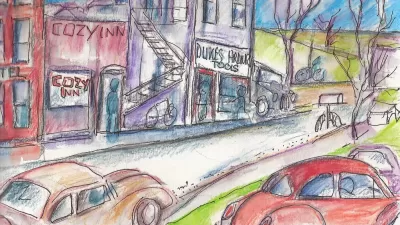Artists tend to flock to big cities where their art can be bought and appreciated, but economic hard times are sending artists fleeing towards cheaper rents on homes and studio space.
Michael Fallon writes that while artists are facing hard times in big art cities like New York and Los Angeles, other cities are rushing in to fill the void:
"Where can artists find arms welcoming enough to provide a chance to sustain their careers? Well, as it happens, perhaps sensing an opportunity in the leveled fields of the current economy several of America's bleakest, and most economically depressed, cities-Detroit, Baltimore, and Cleveland, among others-have begun making their case to become the next American artistic epicenter. All of these places have begun offering incentives like housing allowances (or otherwise cheap housing options), grants and other competitive awards, and other support to artists, even as they promise at least some of the cultural amenities-museums, arts events, and the like-that one can find in the Big Cities."
FULL STORY: A Diaspora of Artists

Alabama: Trump Terminates Settlements for Black Communities Harmed By Raw Sewage
Trump deemed the landmark civil rights agreement “illegal DEI and environmental justice policy.”

Planetizen Federal Action Tracker
A weekly monitor of how Trump’s orders and actions are impacting planners and planning in America.

The 120 Year Old Tiny Home Villages That Sheltered San Francisco’s Earthquake Refugees
More than a century ago, San Francisco mobilized to house thousands of residents displaced by the 1906 earthquake. Could their strategy offer a model for the present?

Indy Neighborhood Group Builds Temporary Multi-Use Path
Community members, aided in part by funding from the city, repurposed a vehicle lane to create a protected bike and pedestrian path for the summer season.

Congestion Pricing Drops Holland Tunnel Delays by 65 Percent
New York City’s contentious tolling program has yielded improved traffic and roughly $100 million in revenue for the MTA.

In Both Crashes and Crime, Public Transportation is Far Safer than Driving
Contrary to popular assumptions, public transportation has far lower crash and crime rates than automobile travel. For safer communities, improve and encourage transit travel.
Urban Design for Planners 1: Software Tools
This six-course series explores essential urban design concepts using open source software and equips planners with the tools they need to participate fully in the urban design process.
Planning for Universal Design
Learn the tools for implementing Universal Design in planning regulations.
Clanton & Associates, Inc.
Jessamine County Fiscal Court
Institute for Housing and Urban Development Studies (IHS)
City of Grandview
Harvard GSD Executive Education
Toledo-Lucas County Plan Commissions
Salt Lake City
NYU Wagner Graduate School of Public Service




























